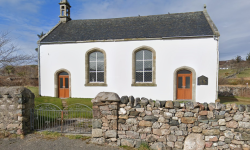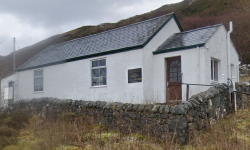John Gunn, Kinlochbervie
From: George Macdonald, Men of Sutherland:
John Gunn was born in the year 1806 at Skerray [Skerricha], a township on the west coast of Sutherland, in the quoad sacra parish of Kinlochbervie, which forms the northern portion of the parish of Eddrachillis or Scourie. His father, John Gunn, senior, came from Caithness when a young man, and was a weaver to trade. He resided first at Scourie, near a bay which was called after him, Bathadh-a-Bhreabadair, or the Weaver’s Bay [Loch Laxford], and afterwards removed to Skerray, where he obtained a croft and settled. His son John, the subject of this notice, followed his father’s occupation, and when of age obtained a croft at a place called Malban1, a peninsula to the south of Skerray [Skerricha], whither he removed when he got married. There was an incident of rather tragic interest connected with his marriage. The young woman to whom he was to have been married was accidentally drowned. She had accompanied a party who went out in a boat to gather seaweed on a rocky islet at some distance from land. After the men had loaded the boat they went ashore, leaving her to gather more seaweed until their return for another load. Before they got back the tide had overflowed the islet and she had been drowned. This sad event was sorely felt by him, his intended wife being a person of excellent Christian character, who would have been a true helpmeet to him had it been so ordered by Divine Providence. He afterwards married a sister of the deceased and settled at Malban, as already stated, where he remained until that eventful year, 1843, when he removed to Rhubhuailt [Rhuvolt], on the shore of Loch Inchard. His father-in-law, Hugh Mackay or M’Eachan, who also came from Caithness, had three brothers residing in Skerray, all of whom were godly men and much esteemed in that locality. When the crofters were evicted from Skerray, this band of godly brothers emigrated to Canada. One of them, Angus MacEachan, was for some years catechist in Kinlochbervie, but when the evictions took place he, in his old age, though very unwillingly, accompanied his son to Canada along with the other emigrants. He died soon after landing there, and his last words were, “O let my soul live, and it shall give praises unto thee” (Psalm 119:175). The descendants of these godly men are in Canada.
An anecdote regarding another very godly man of the name of Robert Gunn, who lived at Achrisgill in the same parish, is worth relating. This worthy generally wore a long cloak, as was then customary, and when walking along the road one day was accosted by a very profane and impertinent young man. This person took hold of his cloak and, pulling it up, said in a scoffing tone, “I wish you would shew me how to be godly,” insinuating that all the man’s godliness consisted in wearing the prophet’s garb. Robert Gunn replied, “Young man, you had better let godliness alone, lest it break your neck.” About a fortnight thereafter the scoffer was riding out when he fell off his horse and broke his neck. Such was the miserable end of one who chose to ridicule a servant of God. The writer was informed that John Gunn feared the Lord from his youth, and during his long subsequent life the, faithful and steadfast testimony which he bore upon the Lord’s side proved the reality of his conversion. I have heard him tell of his having undergone severe assaults from the tempter for a season, but these resulted in his being more firmly established in the faith. The distinguishing feature of his character. was his profound reverence for and love of the Word of God. When reading the Scriptures he did it in so impressive and emphatic a manner that a thoughtful listener would be led to see a meaning in the passage read which he had not previously noticed. In conversation and specially in prayer, his words were solid and weighty, well considered and bearing the impress of sincere conviction. His public addresses as a Friday speaker and on Communion occasions power of godliness accompanied with sound practical counsels and exhortations to believers as well as solemn warnings to the careless and ungodly. He was never tedious, and at times he would make a remark so original and piquant as to bring a smile upon the countenances of his audience. Speaking on one occasion at an evening prayer meeting he said, “When Jonah landed on the shore after being vomited out by the fish, he did not look very like a minister!”
For a period of about forty years John Gunn regularly attended the Communions in Sutherland and parts of Ross-shire, and took a prominent part at these solemnities as a Friday speaker and at prayer meetings. Several godly men from the Reay country accompanied him, namely, John Mackenzie, Scourie; George Mackay and John Munro from Melness, and latterly Donald Sutherland, or “Kenneth,” from Durness. It was a rare sight and a beautiful Instance of brotherly love to see this group of godly men walking together at the time of a Communion. They always kept together and resembled the children of one family, or the disciples of Christ, as in were the outcome of his deep experience of the reality they were. John Mackenzie, Scourie, a fine specimen of a Christian, and a very intelligent man, became blind in his latter years, and his friend, John Gunn, always led him by the hand to the sacramental gatherings.
John Gunn was ordained an elder in the Free Church of Kinlochbervie during the first year of the ministry of the Rev. Donald Corbet. Mr Corbet was for sixteen years minister at Kinlochbervie, and was a godly man and an able preacher much respected by the people.
For a few years before his death John Gunn was laid aside through the infirmities of old age, and latterly confined to bed, but his faculties remained unimpaired to the last. When unable to read through failing eyesight he would sing the Psalms from memory during the night watches. A visitor to the house who was awakened by the sound was much impressed and solemnised. He could truly unite with the Psalmist in saying, “His song’s with me by night.” He passed to his rest on 5th September, 1899, at the advanced age of ninety-three, his wife having predeceased him by sixteen years. Mrs Gunn died in 1883 aged eighty-three.
Footnote:
1. According to the 1841 census John Gunn, who is listed as the tenant, his wife, Christy, and their three daughters, Lucy, Mary and Georgina were living at Kensally (Kinsaile). By the 1851 census they had moved to Rhuvolt and by then had a family of six – sons, John and Hugh, as well as a daughter, Jane, being added to the family.
————————-
The Statutory Death Records for the Kinlochbervie District show that John Gunn died in 1900 at the age of 93 and that his wife, Christy nee Mackay, died at age 84 in 1888. They were married in February 1832.
Alexander Marcrae wrote of him in his book — Kinlochbervie, Being the story and traditions of a remote Highland parish and its people:
John Gunn was one of the best-known among “the men” of Sutherland in his time. In Caithness and Ross-shire he was well known and highly esteemed as a faithful and helpful speaker on communion Fridays. In the parish he bore witness to the Lord and His grace such as no one else before or since has ever done. If the minister was from home John Gunn conducted the service of the Sabbath to the delight of the discerning. Every Sabbath evening while he lived, he held a meeting in his kitchen that proved a means of grace to many. He read Bunyan and Boston, Flavel and Fuller, and other sappy Puritans – strong meat which he enjoyed himself and which he delighted to break down for the use of his hearers. His influence in the parish was paramount. For many of us in those days the fear of Shockie Guinne was incomparably more effective in our general conduct, especially on Sabbath, than the fear of God.

